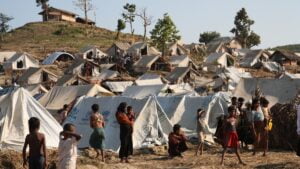ButSpeak.com
News which Matters.

Around 8,000 Rohingya Muslims have fled to Bangladesh in recent months due to intensifying violence in Myanmar’s Rakhine state, adding pressure to already overcrowded refugee camps.
In a desperate bid to escape escalating violence in Myanmar’s Rakhine state, around 8,000 Rohingya Muslims have fled to Bangladesh in recent months, according to Bangladeshi officials. The surge in refugees comes as fighting intensifies between Myanmar’s ruling military junta and the Arakan Army, a powerful ethnic militia drawn from the region’s Buddhist majority.
“We have information that around 8,000 Rohingya crossed into Bangladesh recently, mostly over the last two months,” said Mohammad Shamsud Douza, a senior official overseeing refugee affairs for the Bangladeshi government. However, he also noted the immense strain this influx is placing on Bangladesh’s resources. “Bangladesh is already over-burdened and unable to accommodate any more Rohingya,” Douza told.
Bangladesh is already home to over a million Rohingya refugees, most of whom fled Myanmar during the brutal military crackdown in 2017, which the United Nations described as having genocidal intent. The new wave of refugees further exacerbates the overcrowded and under-resourced camps in southern Bangladesh, where many Rohingya live in dire conditions with little hope of returning to their homeland.
The Bangladeshi government, while expressing sympathy for the plight of the Rohingya, has made it clear that the country’s capacity to provide humanitarian aid is stretched to its limits. “It is not possible to fully seal the border,” said Mohammad Touhid Hossain, Bangladesh’s de-facto foreign minister, acknowledging the challenges in preventing further crossings. Hossain also indicated that the government would soon hold a “serious discussion at the cabinet” to address the growing crisis.
The ongoing violence in Myanmar has led to the worst humanitarian situation for the Rohingya since the 2017 crackdown. Tens of thousands of refugees in Bangladesh marked the seventh anniversary of that military campaign on August 25, holding rallies in the camps to demand an end to violence and a safe return to their homeland.
Among the recent arrivals, many have voiced their desperation for assistance. “How long can we stay with relatives in such a cramped space?” asked a Rohingya refugee who fled to Bangladesh last month with his family. “We appeal to the government to provide us with shelter and ensure we receive food and other essential assistance.”
Despite Bangladesh’s call for international support, the situation remains dire. Last month, Hossain urged India and other nations to take greater action to address the crisis and called on the global community to apply pressure on the Arakan Army to halt its attacks on the Rohingya in Rakhine state.
As the violence in Myanmar shows no signs of abating, the international community faces increasing pressure to intervene and support both the Rohingya refugees and the countries, like Bangladesh, that are bearing the brunt of this humanitarian crisis.